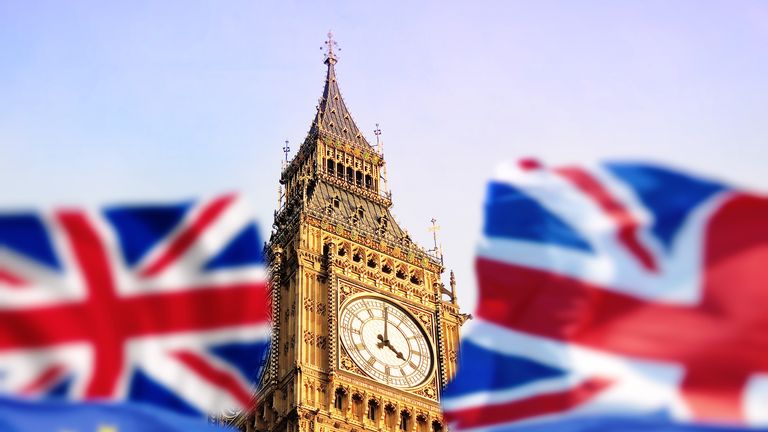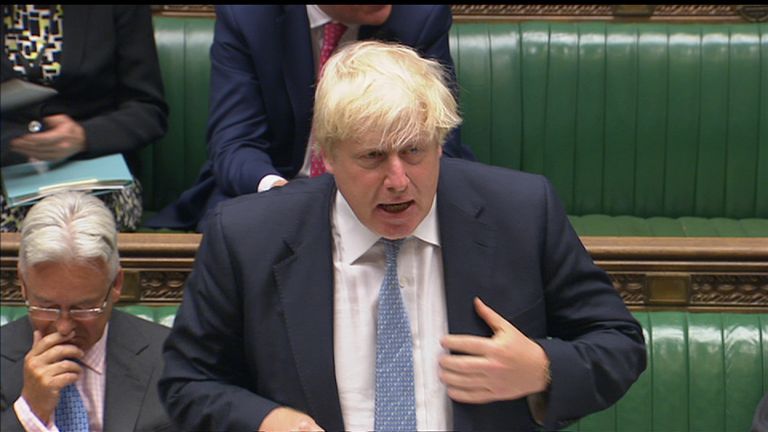Repeal Bill: May accused of 'naked power-grab' over key Brexit legislation
The Scottish and Welsh governments hit out Theresa May over the Repeal Bill, saying the legislation undermines devolution.
Friday 14 July 2017 14:12, UK
The Government has published the central plank of its Brexit strategy, but critics have rounded on the Repeal Bill, accusing Theresa May of a "naked power-grab".
The legislation, which ends the supremacy of EU law over British legislation and repeals the bill that took the country into the bloc, will "maximise continuity" on the day of the UK's departure "where it is practical and sensible", according to the Government.
EU laws will be converted into domestic law, allowing the Government to decide which rules and regulations it wants to keep post-Brexit.
Ministers hope the bill will give confidence to businesses, workers and consumers that they will not face unexpected changes on the day of Brexit.
But the first battle lines over the key piece of legislation have already been drawn.
The Scottish and Welsh governments have said they cannot recommend that legislative consent is given to the bill as it stands.
In a joint statement, first ministers Nicola Sturgeon and Carwyn Jones described it as a "naked power-grab" that undermined devolution.
But UK Scottish Secretary David Mundell said the legislation would result in a powers "bonanza" for Holyrood and said he was confident of getting legislative consent.
Labour has previously said it will vote against the bill if the European Charter of Fundamental Rights is not incorporated into British law, something which the Government has now confirmed will be ditched.
Liberal Democrat leader Tim Farron has previously warned ministers they face "hell" as they try to get the bill through the Houses of Commons and Lords.
And he said the "political nightmare" could end Theresa May's stint as Prime Minister.
Mrs May and Brexit Secretary David Davis have called on parties to work together to ensure the bill goes through Parliament.
But Mrs May's minority government has put itself on a collision course with Labour, with Jeremy Corbyn's party making the charter a "red line" for its support of the bill.
Mr Corbyn said: "Far too much of it seems to be a process where the Government will decide through statutory instruments and therefore will be able to bypass Parliament.
"We will make sure there is full parliamentary scrutiny."
Ministers are understood to believe the rights in the charter are contained in the EU rules which the legislation will convert into domestic law.
Britain will also keep its own domestic rights and protections and remain a member of the European Convention on Human Rights, leading the Government to believe leaving the charter will not have a significant effect.
But shadow Brexit secretary Sir Keir Starmer has made clear Labour would not support the Bill in its current form.
He has demanded concessions in six areas, including incorporating the charter into UK law, ensuring workers' rights in the UK do not fall behind those in the EU, and limiting the scope of so-called "Henry VIII powers", which could allow the Government to alter legislation without full parliamentary scrutiny.
As well as the clash on the charter, there is also likely to be a clash over the bill's creation of the "Henry VIII powers", which the Government insists will be limited to correct minor issues in the law.
It is understood that the number of new regulators required is estimated to be in single figures.
But 800 to 1,000 pieces of secondary legislation, known as statutory instruments, are likely to be required under the powers and given there is a two-year window in which to exercise them, there are likely to be objections from MPs and peers.







